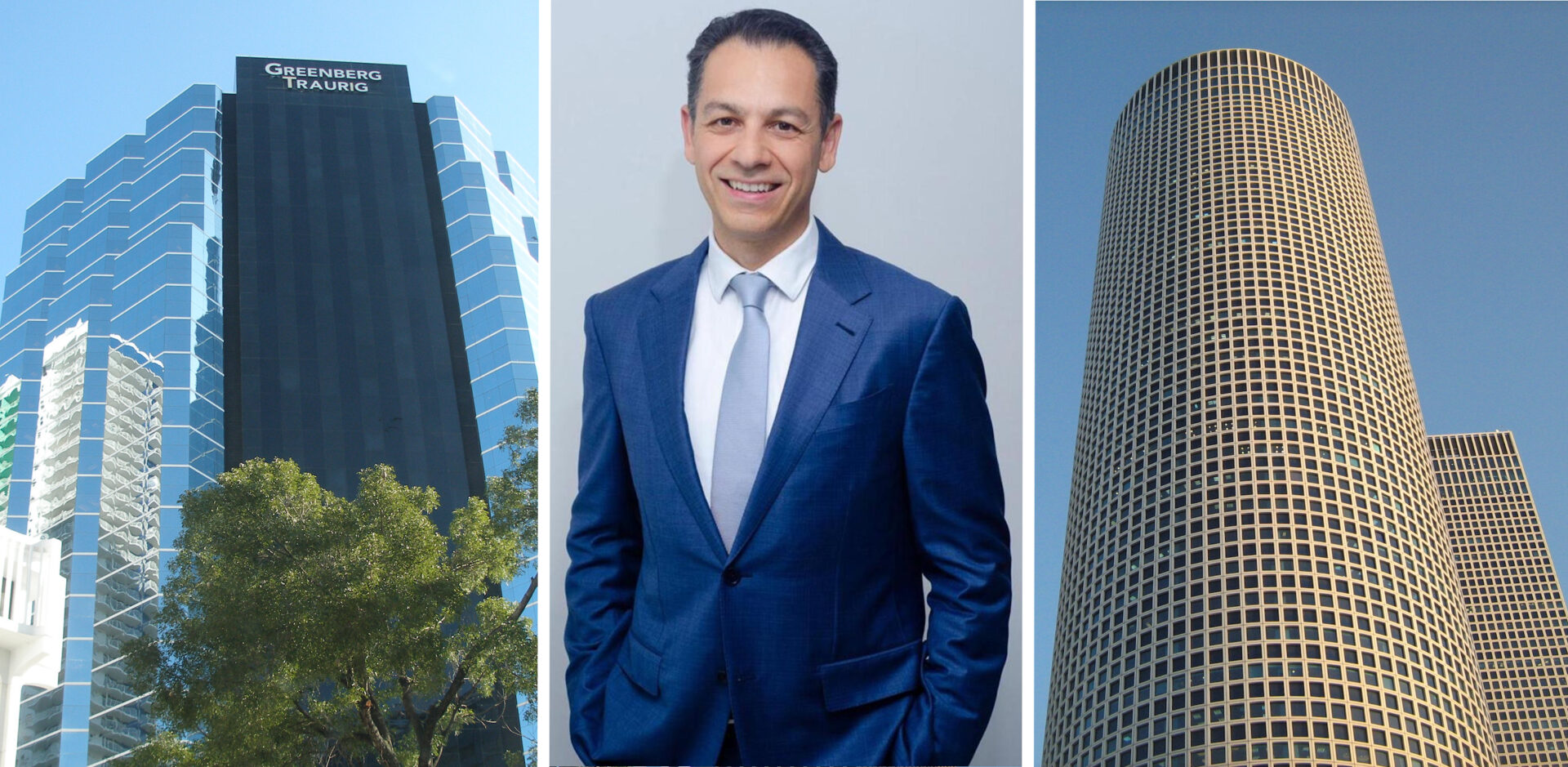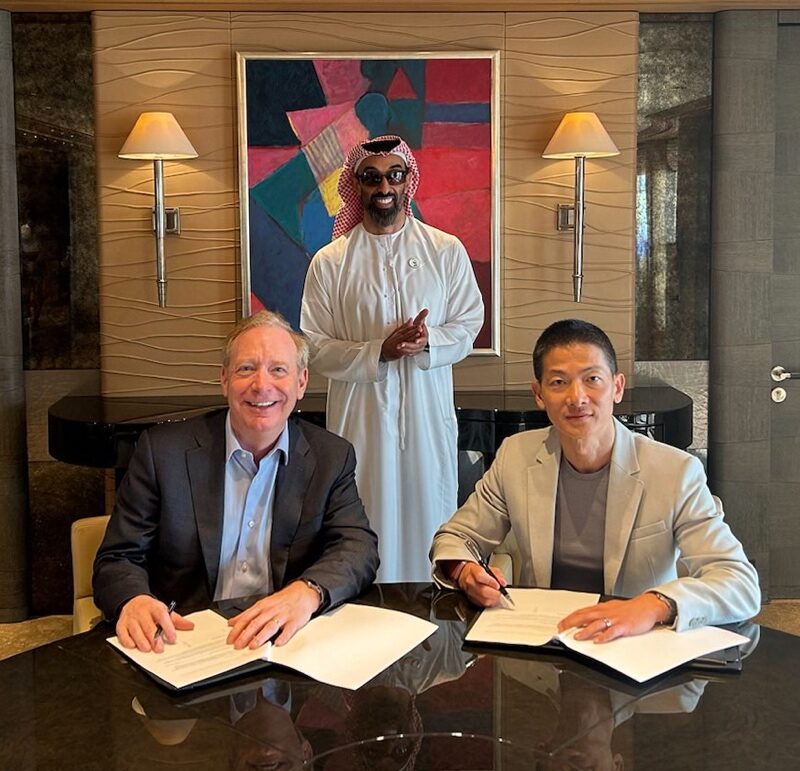
TOMER JACOBSON, WIKICOMMONS
Greenberg Traurig expands legal business across Middle East
While opening new venture in Saudi Arabia, U.S. firm advises Israel tech clients on getting through IPO drought
TEL AVIV, Israel – Greenberg Traurig, a top-tier U.S. law firm that expanded into Saudi Arabia last week, is counseling clients in Israel to position themselves through the current business lull for whenever the technology market rebounds.
As the Tel Aviv branch sees more mergers and acquisitions in the meantime, its top manager, Joey Shabot, said now is the time for startups to make the complex legal preparations for carrying out a successful initial public offering once conditions improve.
“It doesn’t happen overnight,” Shabot told The Circuit in an interview at his 30th-floor office in Tel Aviv’s Azrieli Center. “To get ready to become an IPO company, it takes like a year and a half.”
Eleven years after he helped open Greenberg Traurig’s Israel office, the first foreign law firm to set up shop in the country, Shabot, the managing shareholder, leads a team of 19 attorneys billing clients for services in fields ranging from banking and labor law to data privacy and cybersecurity. The firm, which employs 2,650 lawyers worldwide, posted its ninth consecutive year of growth, generating nearly $2.2 billion in 2022 revenue.
Founded 56 years ago in Miami, Greenberg Traurig broadened its Middle East footprint through a formal affiliation announced on March 14 with the Riyadh-based Khalid Al-Thebity Law Firm. At the same time Greenberg Traurig is applying to operate as a joint venture with Al-Thebity under new rules that allow international firms to offer advising services as long as their Saudi partners hold at least 25% of the partnership. The Saudi firm specializes in project finance, infrastructure and privatization deals. It was previously affiliated with Cleveland-based Squire Patton Boggs.
“This is a truly unique opportunity to expand in Saudi Arabia at a time of extraordinary growth and innovative development,” Greenberg Traurig’s executive chairman, Richard Rosenbaum, said in a statement. “The change in local guidelines is allowing global law firms to build a genuine presence in the region.”
Last year, Greenberg Traurig’s Israeli office represented ITT Inc. in its $140 million acquisition of Israeli valvemaker Habonim. It also advised Swisscom Ventures on its $6 million investment in blockchain firm Fireblocks, and has worked on several deals involving Volvo Group Venture Capital. Greenberg Traurig represented Goldman Sachs in 2021 as lead underwriter and investment banker for the SPAC (special purpose acquisition company) transaction involving ION, an Israel-based asset management fund, and tech firm Taboola.
Since the 2020 signing of the Abraham Accords, which normalized Israel’s diplomatic relations with the UAE, Bahrain and Morocco, the firm has developed additional business opportunities in the Middle East. Greenberg Traurig also made headlines this year when it dropped rapper Ye – formerly Kanye West – from its client list after he made antisemitic comments.
In Israel, Shabot said foreign investors are still keen on investing in Israeli startups even as a global slowdown and high interest rates are roiling global economies and a proposed judicial overhaul is raising questions about the country’s political direction and financial stability.
“International investors are no less interested today than they were a year ago or two years ago in making acquisitions or investments in Israel,” Shabot said. “What I can tell you is in terms of the effect [of the judicial reform debate] on our business, we haven’t seen it,” he said.
Leading economists, jurists and tech leaders have criticized the changes in the court system proposed by Prime Minister Benjamin Netanyahu’s governing coalition. The legislation has sparked wide-spread protests.
“Our explanation of the situation is that what is happening in the political debates right now has nothing to do with the regulation of startups, with tax, with anything involving your rights as an investor in the company,” Shabot said.
What is more of concern in Greenberg Traurig’s Israel practice is the lower valuations and poor stock market performance of technology companies. In turn, the market for Israeli IPOs, which soared in 2021, plunged 80% last year as investors favored less risky assets in the face of accelerating inflation and rising interest rates.
“In the capital markets we are seeing much fewer listings and SPAC deals, but we do see many companies doing preparatory work, making use of the quiet time to do pre-IPO work,” Shabot said.
GT’s entry into Israel coincided with the evolution of the nation’s tech industry, which saw entrepreneurs holding onto their companies for longer, and building them into larger, sometimes billion-dollar entities, as opposed to selling them off quickly to the highest bidder, as was customary in earlier days. This transition has enabled international law firms and accountants to offer growing companies a network of services for their global business strategies, helping them to set up foreign subsidiaries, hire and fire workers abroad, hold IPOs and implement M&A deals worldwide and comply with international markets, Shabot said.
“The presence of such international law firms is important… as it offers a gateway for Israeli businesses and entrepreneurs seeking legal counsel worldwide,” Niron Hashai, dean of the Arison School of Business at Reichman University in Herzliya, Israel, told The Circuit.
“The major strength of such offices lies in their ability to combine local knowledge of the Israel economy with access to a network of law professionals,” Hashai said. “This combination is pivotal, in order to allow Israeli firms to lower the liabilities involved in doing business abroad, including dealing with diverse business practices, varying types of regulation, as well as language and cultural barriers related to doing business abroad.”
Shabot was born in Syria to Jewish parents who left their home and reached Israel as refugees in 1980. They moved to New York when Shabot was 8, and he went on to college at Harvard and law school at the University of Pennsylvania. His first job was at New York-based Wachtell, Lipton, Rosen & Katz, focused on mergers and acquisitions.
“I got exposed to a really very advanced perspective of the U.S. economy and dealmaking,” Shabot said. Working on a telecommunications acquisition in 2011, Shabot traveled to Israel to clinch the deal.
“That was an eye-opening experience,” he said. “I saw that there was a very sophisticated group of lawyers and investment bankers that were working on these transactions. And I was hearing about Israel more and more in the technology M&A space.”
Shabot and his wife decided to move to Israel for a year to test the waters, and he worked as a visiting attorney with a local law firm, while still being affiliated with Wachtell in the U.S.. During that year, he noticed a news item that said Greenberg Traurig planned to open an office in Tel Aviv.
“I sent a cold email to the people mentioned in the article,” he said. “It changed my life.”


